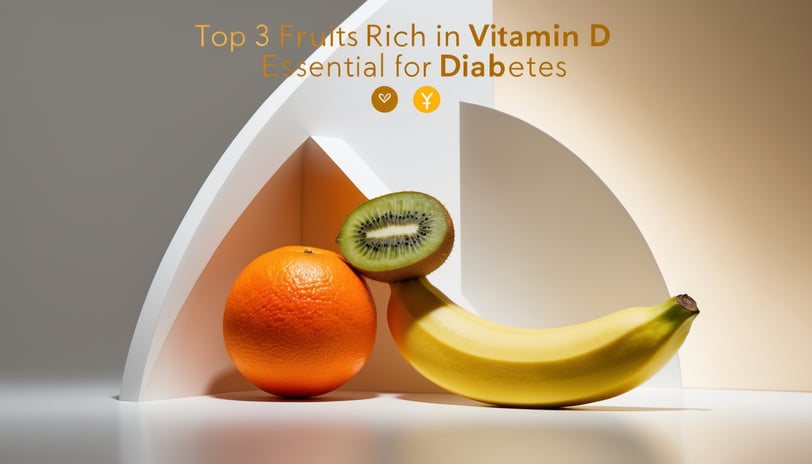Top 3 Fruits Rich in Vitamin D Essential for Diabetes 🌞🍊
Top 3 Fruits Rich in Vitamin D Essential for Diabetes 🌞🍊
Sophia Gold
8/10/20243 min read


Introduction: The Importance of Vitamin D in Diabetes Management
Vitamin D plays a crucial role in maintaining overall health, including supporting immune function, bone health, and insulin sensitivity. For individuals managing diabetes, maintaining adequate levels of Vitamin D is particularly important, as it helps regulate blood sugar levels and may reduce the risk of diabetes-related complications. While Vitamin D is primarily obtained from sunlight exposure and certain fortified foods, there are a few fruits that can also contribute to your Vitamin D intake. In this article, I’ll highlight the top three fruits rich in Vitamin D that can support your diabetes management plan.
1. Oranges
What They Are:
Oranges are a popular citrus fruit known for their high vitamin C content, but they also provide a small amount of Vitamin D. In addition to this, oranges are packed with fiber, antioxidants, and other essential nutrients that support overall health.
Benefits for Diabetes:
Oranges have a low glycemic index, which means they release sugar into the bloodstream slowly, helping to prevent blood sugar spikes. The combination of Vitamin D, fiber, and antioxidants makes oranges a valuable addition to a diabetes-friendly diet.
How to Use:
Enjoy a fresh orange as a snack or add orange segments to salads.
Drink a glass of fortified orange juice, which often contains added Vitamin D.
Use orange zest and juice in marinades, dressings, or baked goods for added flavor and nutrients.
2. Fortified Orange Juice
What It Is:
While not a fruit itself, fortified orange juice is a common source of Vitamin D and is often enriched with this essential nutrient. It provides the same benefits as fresh oranges but with the added advantage of a higher Vitamin D content.
Benefits for Diabetes:
Fortified orange juice is a convenient way to boost your Vitamin D intake while enjoying a refreshing drink. It supports bone health, immune function, and insulin sensitivity, all of which are important for managing diabetes.
How to Use:
Drink a small glass of fortified orange juice with breakfast to start your day with a Vitamin D boost.
Use fortified orange juice as a base for smoothies, combining it with other fruits and vegetables.
Incorporate fortified orange juice into sauces, marinades, and dressings for an extra dose of Vitamin D.
3. Mangoes
What They Are:
Mangoes are a tropical fruit that, while not a significant source of Vitamin D on their own, are often fortified with Vitamin D in certain products like mango juice or dried mango snacks. Mangoes are also rich in fiber, antioxidants, and essential vitamins, making them a nutritious choice for people with diabetes.
Benefits for Diabetes:
Mangoes have a moderate glycemic index, meaning they can be enjoyed in moderation without causing rapid blood sugar spikes. The fiber content in mangoes also helps regulate digestion and stabilize blood sugar levels.
How to Use:
Enjoy fresh mango slices as a snack or add them to fruit salads.
Blend mangoes into smoothies or mix them into yogurt for a tropical twist.
Look for fortified mango products, such as juices or dried mango snacks, to increase your Vitamin D intake.
Conclusion: Boost Your Vitamin D Intake with These Fruits for Better Diabetes Management
While Vitamin D is primarily obtained from sunlight and fortified foods, incorporating fruits like oranges and fortified products such as orange juice and mangoes can help boost your Vitamin D intake. These fruits not only provide essential nutrients but also support blood sugar control, making them valuable additions to a diabetes-friendly diet. By including these Vitamin D-rich fruits in your daily routine, you can enhance your overall health and better manage your diabetes.
Resources for Further Reading:
Healthline: The Benefits of Vitamin D for Health
National Institutes of Health (NIH): Vitamin D and Diabetes Management


